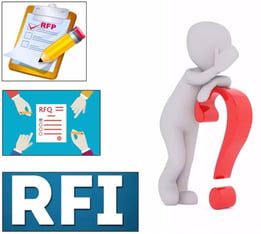
RFIs - Requests for Information are common in the construction industry. They are the means by which contractors ask designers to clarify the construction documents. RFIs may question the drawings, or specifications, or both.
RFIs are the designer's bane. A schedule disruptor, RFIs usurp precious time needed for other planned activities during construction administration.
Contractors count RFIs, sometimes proudly. Many RFIs can help the contractor build a case for a claim against the owner for delay or increased costs, or both.
The point is the process takes time. While the time to process a single RFI may not be significant, the time to process all the RFIs on a project can be substantial.
In 2013, Navigant Construction Forum™ published a report titled "Impact & Control of RFIs on Construction Projects." The report presented findings from 1,362 projects around the world that were started between 2001 and 2012 using a data set from ACONEX, a global provider of online document management. The projects ranged from $5 million to $5 billion construction cost. Each project in the data set had a minimum of 100 RFIs. These projects resulted in 1.1 million RFIs, an average of 796 per project or 9.9 RFIs per $1 million construction cost.
That was nearly 10 years ago. What is the status today? Recently, Conspectus was asked to help answer RFI number 805 for a project that is less than 50% through the 19 month construction schedule. Fortunately, we were asked to help with only a few of these.
Navigant discussed the time required to receive, log, review, and respond to RFIs with design professionals. It was agreed that designers spend on average eight hours or $1,080 (2013 dollars) to process each RFI.

Let's do the math. 796 RFIs per project. 8 hours per RFI design processing time. That is 6,368 hours (more than 3 man-years) or $859,680 expended during construction administration just on RFIs.
So here's the question. What do RFIs cost the contractor, and ultimately, the owner? Is the owner paying nearly $2 million per project to have the designer and contractor communicate to clarify the owner's construction documents?
Navigant focused on managing the process to improve performance. The report suggested a three-pronged framework: setting RFI related definitions, electronic tracking and monitoring, and implementing best management practices. This framework may help, but it does not address the root problem.
What if there was an opportunity for contractors to ask questions during design? What if the construction documentation process was transparent and collaborative? What if all the questions were answered before starting construction?
Conspectus Cloud provides that opportunity. It is a web-based, open specification authoring tool. The designer, contractor, and even the owner can participate. Questions can be asked, explored, and resolved transparently and collaboratively. Leverage everyone's experience and expertise to produce a better project. Call to learn more and to schedule a demo. 609.628.2390.





